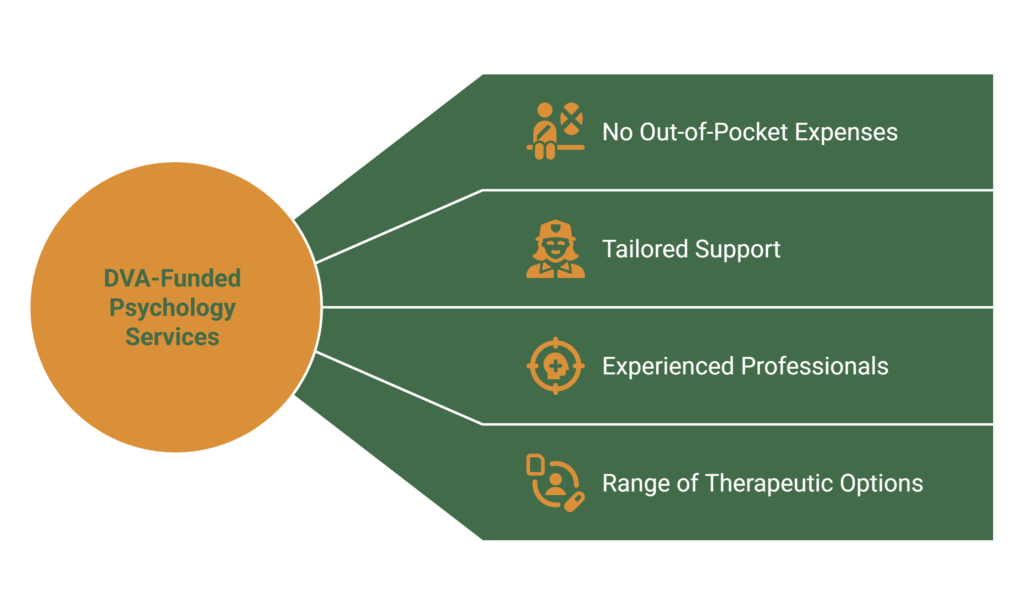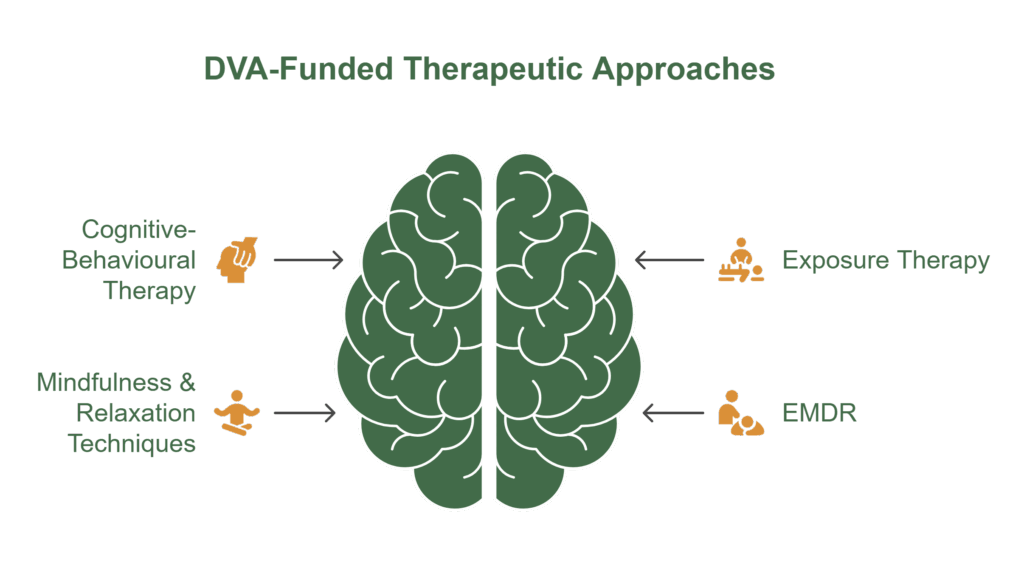Transitioning from military to civilian life can be challenging—often in ways that aren’t immediately visible. Many veterans experience lasting impacts from their service, including PTSD, depression, anxiety and adjustment disorders. These conditions affect not just the individual, but also their relationships, family and quality of life.
Access to consistent psychological support plays an important part in managing these challenges. Yet many veterans face barriers like cost, stigma, or access to appropriate care. That’s why the Department of Veterans’ Affairs (DVA) funds mental health services—so eligible veterans can access professional support at no personal cost.
These services are designed to meet the mental health needs of veterans with evidence-based therapy and a focus on long-term support.
Key takeaways
- Eligible veterans can access ongoing mental health support without paying out of pocket, removing financial barriers to care.
- Psychologists work with veterans using evidence-based therapies like CBT, EMDR, and mindfulness to address PTSD, anxiety, depression, and more.
- DVA-funded therapy is available online, helping veterans in remote or rural areas get consistent support wherever they are.
- Mental health isn’t static—treatment plans can be reviewed and adjusted over time to stay relevant and effective.
Understanding DVA-Funded Psychology Services
DVA-funded psychology services are part of the Australian government’s commitment to supporting veterans’ mental health. The program ensures that eligible veterans receive specialised psychological care at no cost, helping them address a wide range of mental health concerns that may arise due to military service.
Key Benefits of DVA-Funded Psychology Services
- No out-of-pocket expenses – Eligible veterans can receive professional mental health care without financial burden.
- Tailored support – Services are designed specifically for veterans, taking into account their unique experiences and needs.
- Access to experienced professionals – Psychologists with expertise in trauma, PTSD, and veteran-specific mental health concerns provide evidence-based treatment.
- A range of therapeutic options – From Cognitive Behavioural Therapy (CBT) to Eye Movement Desensitisation and Reprocessing (EMDR), veterans have access to various treatment approaches.

The Importance of Ongoing Mental Health Support
Mental health care is not a one-time fix but an ongoing process. Veterans may experience fluctuating mental health challenges throughout their lives, making continued access to psychological support essential. Regular therapy sessions help veterans:
- Manage PTSD, depression, and anxiety more effectively.
- Develop coping strategies for stress, trauma, and adjustment difficulties.
- Improve relationships and communication skills.
- Maintain long-term emotional resilience and well-being.
By offering accessible, high-quality mental health care, DVA-funded psychology services play a vital role in ensuring that veterans receive the ongoing support they need to lead fulfilling lives. If you have faced mental health challenges as a result of your service, you may be entitled to compensation.
Our advocacy team at VetComp can assist you with your claims, book in your free consultation to get the process started.
Eligibility and Access
DVA-funded psychology services are available to Australian veterans who meet specific eligibility criteria. The program ensures that those who have served in the Australian Defence Force (ADF) can access professional mental health care without financial burden.
Who Qualifies for DVA-Funded Psychology Services?
Eligible veterans include:
- Veterans with a DVA White or Gold Card – These cards provide access to a range of health services, including psychological support.
- Current and former full-time ADF members – Those who have served in the regular forces are eligible for DVA-funded psychology services.
- Certain Reservists – Those who have completed at least one day of Continuous Full-Time Service (CFTS) or have participated in Disaster Relief Service or Border Protection Service may also qualify.
Steps to Access Care
To receive DVA-funded psychological support, eligible veterans need to follow these steps:
- Obtain a referral from a General Practitioner (GP) – A GP will assess the veteran’s mental health needs and provide a referral to a DVA-accredited psychologist.
- Find a DVA-accredited psychologist – Veterans must seek treatment from a psychologist registered with the DVA program. Many mental health clinics and counselling services offer DVA-funded sessions.
- Undergo an initial assessment and develop a treatment plan – The first appointment involves a comprehensive assessment of mental health concerns, after which the psychologist will outline a personalised treatment plan tailored to the veteran’s needs.
This structured approach ensures that veterans receive appropriate and effective psychological care, providing a solid foundation for ongoing support. We are able to connect you with veteran-friendly psychological support services after your claims process with us, so reach out if this is something you are interested in.
Available Psychological Services
DVA-funded psychology services offer a variety of evidence-based therapeutic approaches designed to address the unique mental health needs of veterans. These treatments are tailored to assist with PTSD, depression, anxiety, and relationship difficulties.
Therapeutic Approaches Covered by DVA
Veterans accessing DVA-funded psychology services can receive:- Cognitive-Behavioural Therapy (CBT) – A widely used approach that helps veterans identify and reframe negative thought patterns, develop healthier coping mechanisms, and improve emotional resilience.
- Exposure Therapy – Particularly effective for PTSD, this therapy gradually exposes veterans to distressing memories or situations in a controlled environment, helping them to process trauma and reduce anxiety over time.
- Mindfulness & Relaxation Techniques – Techniques such as guided meditation, breathing exercises, and progressive muscle relaxation help veterans manage stress, regulate emotions, and improve overall well-being.
- Eye Movement Desensitisation and Reprocessing (EMDR) – A specialised therapy that helps veterans process traumatic memories and reduce their emotional impact, allowing for better mental clarity and healing.

How These Services Help Veterans
DVA-funded psychological therapies provide essential support in:
- Helping manage PTSD symptoms such as flashbacks, avoidance behaviours and heightened alertness.
- Managing depression and anxiety, improving mood and emotional regulation.
- Enhancing relationships and social interactions, by improving communication and emotional awareness.
- Supporting long-term mental well-being, ensuring that veterans can cope with the ongoing effects of military service.
These therapies offer veterans a pathway to recovery, helping them regain control over their mental health and improve their quality of life. If obtaining this support is something you need assistance with, the VetComp team would love to chat and see how we can best assist you.
Telehealth Options for Remote Access
Recognising that many veterans live in rural or remote areas, DVA has integrated telehealth services into its psychology program. This allows veterans to attend therapy sessions online, eliminating the need for travel while ensuring they receive the same high-quality care.
Benefits of Telehealth for Veterans
- Convenience – Veterans can schedule therapy sessions without the need for long travel times, making it easier to commit to regular appointments.
- Continuity of care – Even if a veteran relocates, they can continue working with their preferred psychologist without interruption.
- Increased access – Veterans who may otherwise struggle to find a local DVA-accredited psychologist can still receive specialised care from professionals across Australia.
By embracing telehealth, the DVA ensures that all veterans, regardless of their location, can access consistent, high-quality mental health support.
Ongoing Support & Treatment Plan Adjustments
Mental health is not a static condition—it evolves over time, influenced by life experiences, personal growth, and ongoing challenges. For veterans, the psychological effects of military service may fluctuate, making consistent mental health support essential.
The Need for Evolving Treatment Plans
What works for a veteran at the beginning of their therapy journey may not be as effective months or years down the track. Treatment plans must adapt to meet changing needs, whether that involves adjusting therapy techniques, modifying session frequency, or incorporating new coping strategies.
Collaboration Between Veterans and Psychologists
DVA-funded psychology services emphasise a collaborative approach, where veterans work closely with their psychologists to:
- Review progress and assess how well current strategies are working.
- Identify new challenges and adjust treatment plans accordingly.
- Explore alternative therapies if initial approaches do not yield desired results.
This flexibility ensures that veterans receive ongoing, tailored support, rather than a one-size-fits-all approach that may lose effectiveness over time.
The Role of Ongoing Therapy in Long-Term Well-being
Regular psychological support helps veterans:
- Maintain emotional resilience by developing and reinforcing coping skills.
- Manage PTSD, anxiety, and depression in a way that adapts to their evolving needs.
- Strengthen relationships by improving communication and emotional regulation.
- Improve overall quality of life, encouraging personal growth and stability.
By prioritising ongoing mental health care, veterans can navigate life’s challenges with confidence, ensuring they remain supported long after their initial treatment phase. Mental health challenges can also have impacts on your ability to work and other factors that may cause financial insecurity. You may be entitled to compensation as a result of your conditions, so book in for a free consultation with our team and let us help you through this process.
Supporting Your Mental Health, Long Term
Mental health is just as important as physical health, yet many veterans find it hard to access or ask for the support they need. DVA-funded psychology services provide a vital lifeline—removing the financial barrier to ongoing, professional mental health care.
With regular therapy, telehealth options and access to experienced psychologists, veterans can better manage conditions like PTSD, depression, anxiety and adjustment disorders. As needs change over time, treatment plans can evolve, too—helping care stay relevant and effective.
It’s time to break the stigma around mental health and remind veterans that seeking support is a strength, not a weakness.
If you’re living with mental health challenges linked to your service, support is available.
Contact VetComp today and let us help you get the support you deserve.
FAQs
We’ve gathered our most commonly asked questions here, so you can feel informed, at ease, and ready to take the next step toward the support and benefits you deserve.
Do I need a mental health diagnosis to access DVA-funded psychology services?
No. You don’t need a formal diagnosis to begin accessing support. If you’re experiencing mental distress or believe your service may have impacted your mental well-being, a GP can provide a referral to a DVA-accredited psychologist to begin your sessions.
Can I choose my own psychologist, or will one be assigned to me?
You have the freedom to choose your own DVA-registered psychologist. This allows you to find a practitioner you feel comfortable with and who understands your unique needs. If you need help finding a veteran-friendly provider, VetComp can help connect you with the right services.
How many sessions am I entitled to under DVA funding?
There’s no strict limit for eligible veterans. Treatment duration is determined based on clinical need, with periodic reviews. Your psychologist will develop an ongoing treatment plan and request further sessions as needed, ensuring care remains tailored and effective.
Is DVA-funded psychology only for combat-related mental health issues?
Not at all. While PTSD is common, DVA-funded services also support veterans facing depression, anxiety, grief, adjustment disorders, substance use, and other psychological challenges—whether or not they are directly related to combat.
What if I’m already seeing a psychologist privately—can I switch to DVA funding?
Yes, you can transition to DVA-funded services. You’ll need to check if your current psychologist is DVA-accredited. If they’re not, you can either ask them to register with DVA or switch to another accredited provider. A referral from your GP is still required.
Will DVA or anyone else have access to what I share in therapy?
No. Your sessions are confidential. While your psychologist may submit treatment summaries to the DVA for continuation of services, the details of what you share remain private and protected under standard health privacy laws.
Can I get DVA-funded support if I live overseas?
Yes, in some cases. DVA may approve mental health services delivered via telehealth for veterans living overseas, but this is assessed on a case-by-case basis. You’ll need to check with DVA and your provider to confirm eligibility.



